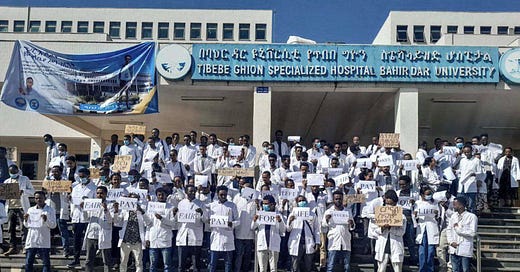Doctors on strike, Ethiopian government on the attack
Doctors and healthcare workers are going on strike to demand better pay. But instead of negotiating, the government is locking them up.
Siyanne Mekonnen
On average, doctors in Ethiopia earn just $80 a month – a fraction of what their counterparts elsewhere in Africa take home. Now, doctors and healthcare workers are going on strike to demand better pay. But instead of negotiating, the government is locking them up.
Over the past two decades, Ethiopia’s healthcare system has been radically transformed. The government has poured investment – and leveraged international development aid – into expanding access to basic services, with startling results.
As of 2019, 48% of births took place in a healthcare facility – up from just 5% in 2001. Over the same period, the percentage of children receiving basic vaccinations rose from 14% to 43%, according to the Health Policy Plan academic journal.
To support the expansion of its healthcare system, Ethiopia introduced a “flooding” policy to train tens of thousands of healthcare workers. It worked: the number of trained doctors in the country increased nearly tenfold in two decades from 1,936 (in 2003) to more than 18,400 (in 2023), according to World Health Organisation data. The number of nurses and midwives increased at an even faster pace. The country’s population grew too, but at a much lower pace, to less than double what it was then.
Ethiopia’s story was “often seen as a model for primary care in low-income countries”, according to Health Policy Plan. But the “flooding” created a new problem: how would all these doctors, nurses and clinicians get paid?
Ethiopia’s answer has been low wages. The national average salary for doctors in Ethiopia is just $80 a month, according to Amnesty International. By comparison, doctors in Kenya are earning around $1,600 a month, while their peers in South Africa usually bank more than double that.
With recent cost of living increases, the low wages have become untenable, Ethiopian doctors say. Earlier this month, across the country, they went on strike to demand pay increases and better working conditions.
“Years of training, only to make $85 a month, is why we went on a strike. This isn’t about politics, it is about survival,” one young doctor in Addis Ababa told The Continent.
“We are at a point where economic hardships are on the verge of killing us and our children,” said another.
Although the cost-of-living crisis is being felt across the country, the strike poses more fundamental questions about how the government values its health workforce. The health sector receives just 8.3% of the government budget (far below the 15% target set in the African Union’s Abuja Declaration).
A third-year resident at Hawassa University Comprehensive Specialized Hospital, who is also on strike, said: “This all has revealed that the healthcare system is only symbolic. The government clearly doesn’t care about the patients and assumes that since a healthcare worker’s salary doesn’t last a month as it is, it’s a matter of time before we get back to work whether or not our grievances are addressed.”
“We are at a point where economic hardships are on the verge of killing us and our children.”
The health ministry warned that it would take legal measures against healthcare professionals who are participating in the ongoing strike. The state minister of health, Dr Dereje Duguma, did not respond to requests for comment.
The government is carrying out its threats: on 22 May, Amnesty International received a list of 121 professionals who have been arrested across the country since the strike began. The Ethiopian Federal Police Commission says it has detained and is investigating 47 healthcare professionals who it accused of staging “illegal strikes”, enticing others to disrupt healthcare, and endangering the lives of citizens.
Among the detainees was Yonatan Dagnew, the president of the Ethiopian Health Professionals Association, who was held by security forces in the Amhara region for several days.
“This should not have led to detention and could have been solved through discussions. We continue to ask for the release of our colleagues across the country,” he told The Continent.
The situation is even worse in the Tigray region, which is still recovering from the brutal civil war between 2020 and 2022. Despite working on the front lines of a health system that was destroyed, doctors in this area were not paid for 17 months throughout the war – and remain underpaid compared to their colleagues in other areas.
One doctor from Tigray said: “Many of us have continued to serve under extreme pressure, through war, pandemic, and poverty. To continue working under current conditions would be professionally irresponsible and personally unsustainable. The emotional toll is significant. Many feel exhausted, ignored, and betrayed after years of sacrifice.”






